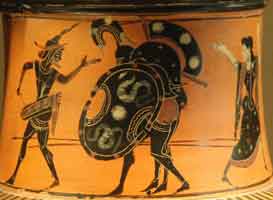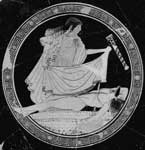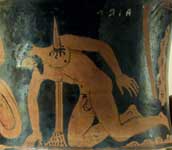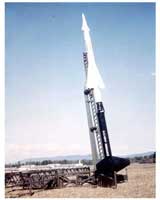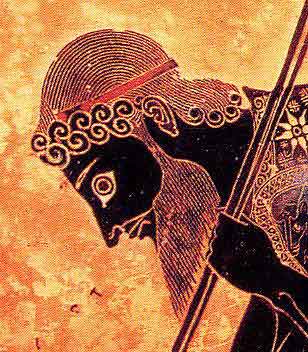
Head and Shoulders of Ajax, Exekias
I heard a story of the Aeolians who afterwards settled at Ilium, to the effect that when Odysseus suffered shipwreck the armour was cast ashore near the grave of Ajax. As to the hero's size, a Mysian was my informant. He said that the sea flooded the side of the grave facing the beach and made it easy a enter the tomb, and he bade me form an estimate of the size of the corpse in the following way. The bones on his knees, called by doctors the knee-pan, were in the case of Ajax as big as the quoit of a boy in the pentathlon. Pausanias , Description of Hellas
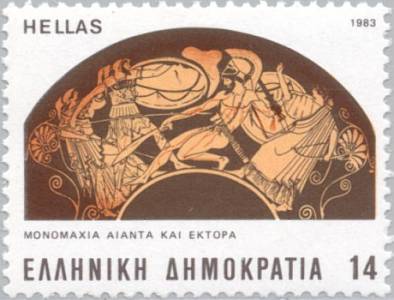
The Trojan hero Hector and brother of Paris versus the Greek Ajax, the son of Telamon of Salamis
Aias (Greek: 'Αίας': 'Of the Earth'), or Ajax, king of Salamis, a legendary hero of ancient Greece.
Aias the Great
To distinguish him from Aias, son of Oileus, he was called Aias the Great or Telamonian Aias. In Homer's Iliad he is described as of great stature and colossal frame, second only to Achilles in strength and bravery, and the 'bulwark of the Achaeans'. He was trained by the centaur Chiron (who had also trained his father, Heracles, and Achilles' father Peleus), at the same time as Achilles was. Outshined only by his cousin, Ajax was the most valuable king in the battlefield, though not as smart as Nestor, Idomeneus, or, of course, Odysseus. He commanded his army wielding a great axe and a huge shield made of seven ox-hides with a layer of bronze, always accompanied by the prince Teucer. He was indeed a great asset to king Agamemnon's army. He is not wounded in any of the battles described in the Iliad, and he is the only principal character on either side who does not receive personal assistance from any of the gods who take part in the battles. As such, he embodies the virtues of hard work and perseverance.
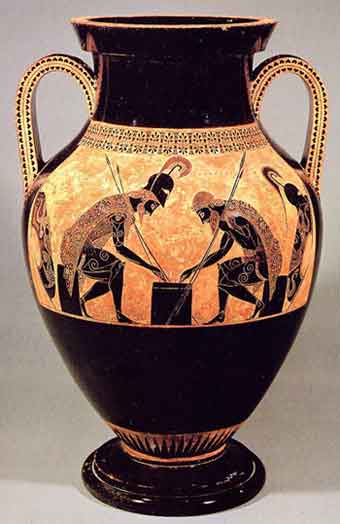
Ajax and Achilles playing a game, an invention of Exekias, undocumented in literature
Trojan War
During the Iliad, Ajax is notable for his two fights with Hector. The first time, in Book VII, is in a duel which lasts most of a whole day. Ajax at first gets the better of the encounter, wounding Hector with his spear and knocking him down with a large stone, but Hector fights on until the heralds, acting at the direction of Zeus, call a draw: the action ends without a winner and with the two combatants exchanging presents.
In Book IX of the Iliad, Agamemnon and the other Greek chiefs send Aias, accompanied by Odysseus and Phoenix, to the tent of Achilles, in an attempt to reconcile with the great warrior and induce him to return to the fight. Although Aias speaks earnestly and is well received, he does not succeed in convincing Achilles.
The second fight occurs when Hector breaks into the Achaean camp, and fights with the Greeks among the ships. Ajax throws a giant rock at Hector which almost kills him. Later, Hector regains his strength and makes an assault that almost finishes the war. Both of these encounters happened when Achilles wasn't on the battlefield, because he was angered with Agamemnon. Ajax did manage to kill a lot of other Trojan lords, including Phorkys.
When Patroklos died, the Trojans tried to steal his body and feed him to the dogs, accusing him of being a liar. Ajax is the man who fights to protect the body, and take it back safely to the camp, back to Achilles, the best friend and lover of Patroklos. Ajax, assisted by Menelaus, succeeds in fighting off the Trojans and taking the body back with his chariot; of course, the Trojans had already stolen the armor and left the body naked. Ajax's prayer to Zeus, to remove the fog which has descended on the battle - even if the Greeks are destined to lose - to allow them to die in the light, has become proverbial. Like most of the other Greek leaders, Ajax is alive and well as the Iliad comes to a close.
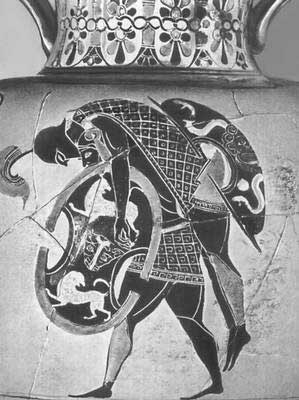
Ajax carrying the body of Achilles |
Later, when Achilles dies, killed by Paris, Ajax and Odysseus are the heroes that fight against the Trojans to get the body and bury it next to his lover, Patroklos. Ajax, with his great axe, manages to get the Trojans away, while Odysseus pulls the body towards his chariot, and rides away. After the burial, both claim the armor for themselves, as recognition for their efforts. But in the end, after some discussion, Odysseus is given the armor. Ajax is furious about it, and falls to the ground, exhausted. When he wakes up, he becomes mad and goes to a group of sheep, and slaughters them, imagining they're the Trojan leaders, as well as Odysseus and Agamemnon. When he comes to his senses, covered in blood, and realises what he did, he decides that he prefers to kill himself rather than to live in shame. He did it with the same sword Hector had given him when they exchanged presents. (Odyssey, xi. 541). From his blood sprang a red flower, as at the death of Hyacinthus, which bore on its leaves the initial letters of his name Ai, also expressive of lament (Pausanias i. 35. 4). His ashes were deposited in a golden urn on the Rhoetean promontory at the entrance of the Hellespont.
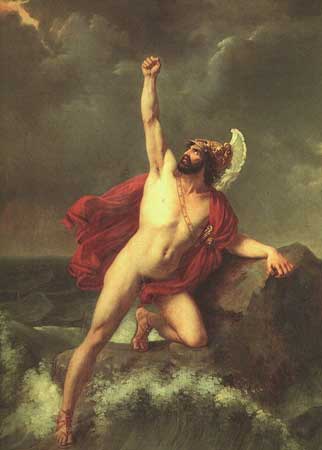
Death of Ajax, 1820 Serrur
The foregoing account of his death is from the Ajax of Sophocles; in Pindar's "Nemea", 7; and in Ovid, Metamorphoses, xiii. 1. Homer is somewhat vague about the precise manner of Ajax's death but does ascribe it to his loss in the dispute over Achilles's armour: when Odysseus visits Hades, he begs the soul of Ajax to speak to him, but Ajax, still resentful over the old quarrel, refuses and descends silently back into Erebus.
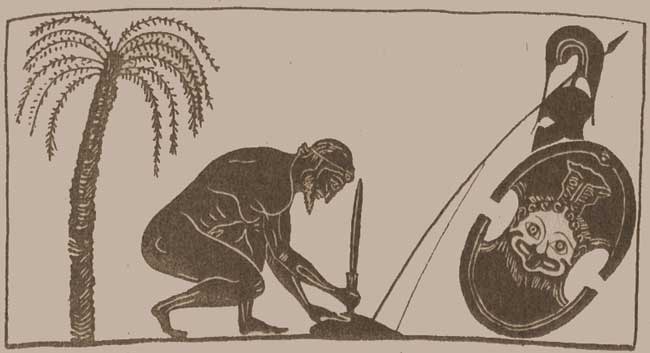
Ajax the Great adjusts the sword for his suicide. Pottery painting c. 530-525 BC
Like Achilles, he is represented (although not by Homer) as living after his death in the island of Leuke at the mouth of the Danube (Pausanias iii. 19. 11). Aias, who in the post-Homeric legend is described as the grandson of Aeacus and the great-grandson of Zeus, was the tutelary hero of the island of Salamis, where he had a temple and an image, and where a festival called Aianteia was celebrated in his honour (Pausanias i. 35). At this festival a couch was set up, on which the panoply of the hero was placed, a practice which recalls the Roman lectisternium. The identification of Aias with the family of Aeacus was chiefly a matter which concerned the Athenians, after Salamis had come into their possession, on which occasion Solon is said to have inserted a line in the Iliad (book ii. 557 or 558), for the purpose of supporting the Athenian claim to the island. Aias then became an Attic hero; he was worshipped at Athens, where he had a statue in the market-place, and the tribe Aiantis was called after his name.
Family
Aias is the son of Telamon, who was the son of Aeacus, son of Zeus. He is the cousin of Achilles, the most remembered Greek warrior and elder half-brother of Teucer.
Many illustrious Athenians -- Cimon, Miltiades, Alcibiades, the historian Thucydides -- traced their descent from Aias.
News
28.3.2006 Palace of Ajax' found in Greece
Palace
In 2001, Yannos Lolos began excavating a Mycenaean palace on the island of Salamis that may have been Ajax's home. The ruins have been excavated at a site near the village of Kanakia of Salamis, a few miles off the coast of Athens. The multi-storey structure covers 750 m² (8,000 ft²) and had perhaps 30 rooms. It appears to have been abandoned at about the era of the Trojan War. [1]
References
- Homer. Iliad VII, 181-312; Homer. Odyssey XI, 543-67; Apollodorus. Epitome III, 11-V, 7; Ovid. Metamorphoses XII, 620-XIII, 398.
- The laundry detergent brand Ajax's slogan is "Stronger than dirt", presumably in the mythological reference.
- HMS Ajax (part of the UK Royal Navy) was named after him, but is no longer in use
- The USS Ajax was named for his valor
- In the 2004 film Troy, Ajax was played by wrestler Tyler Mane.
See also : Greek Mythology. Paintings, Drawings
Retrieved from "http://en.wikipedia.org/"
All text is available under the terms of the GNU Free Documentation License
| Ancient Greece
Science, Technology , Medicine , Warfare, , Biographies , Life , Cities/Places/Maps , Arts , Literature , Philosophy ,Olympics, Mythology , History , Images Medieval Greece / Byzantine Empire Science, Technology, Arts, , Warfare , Literature, Biographies, Icons, History Modern Greece Cities, Islands, Regions, Fauna/Flora ,Biographies , History , Warfare, Science/Technology, Literature, Music , Arts , Film/Actors , Sport , Fashion --- |

